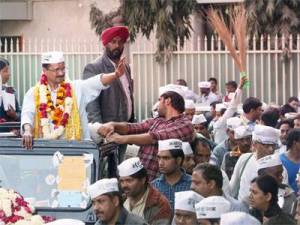 New Delhi, Jan 14: AAP is likely to sweep Delhi, bagging six of the seven seats, pick up a seat in Greater Mumbai and one in the Noida-Ghaziabad area in the coming Lok Sabha polls, according to an opinion poll done in the NCR region and in the Mumbai-Greater Mumbai areas. The party is also set to mark its presence in the other NCR satellite cities, though it may not win a seat in them, the poll suggested.
New Delhi, Jan 14: AAP is likely to sweep Delhi, bagging six of the seven seats, pick up a seat in Greater Mumbai and one in the Noida-Ghaziabad area in the coming Lok Sabha polls, according to an opinion poll done in the NCR region and in the Mumbai-Greater Mumbai areas. The party is also set to mark its presence in the other NCR satellite cities, though it may not win a seat in them, the poll suggested.
The poll, conducted by AC Nielsen for ABP News, also predicted that AAP's impressive performance in these areas would result in Congress and UPA getting virtually decimated, winning just three of the 21 seats in all these cities put together, compared to the 17 it won last time. The BJP, the poll projected, would win 10 of the 21 and AAP eight.
Despite the strong showing the poll predicts for BJP, its findings may give the party reason to worry as it indicates that AAP could become a significant player in urban areas and not let BJP make the most of any anti-Congress feeling.
The poll found that Narendra Modi remains the preferred choice for prime minister in both Delhi-NCR and Mumbai-Thane, although in the capital region, he is only slightly ahead of Arvind Kejriwal, with 45% picking the BJP leader and 42% backing the Delhi chief minister.
In Mumbai-Thane, Modi has an impressive 51-18 lead over Kejriwal. In fact, Rahul Gandhi, with 22% in Mumbai-Thane backing him, is ahead of Kejriwal, though he is a distant third in Delhi-NCR with just 16% preferring him as PM.
According to the poll, AAP would win six seats in Delhi with an impressive 57% vote share and win one of the Noida-Ghaziabad duo with 33% of the votes. In Mumbai-Thane too, it would win one seat with 17% of the votes. In Gurgaon-Faridabad, it would pick up 21% of the votes, which would be insufficient for the party to bag either of the two seats.
The Congress tally is predicted to drop drastically not just in seats, but also in vote share in all these areas. The BJP's vote share, in comparison, would rise somewhat in Mumbai and Noida-Ghazaiabad and significantly in Gurgaon-Faridabad. However in Delhi, the saffron party too could see its vote share declining considerably. In Noida-Ghaziabad, the BSP would also be a significant loser both in terms of vote share and by way of losing the one seat it currently has.







Comments
Add new comment